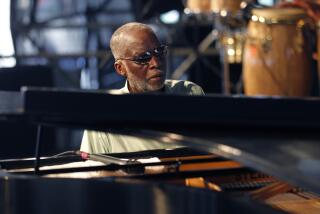Journalist Facing Death Denied New Trial : Courts: Mumia Abu-Jamal, whose case has attracted international attention, claimed he was framed in Philadelphia policeman’s death.
- Share via
WASHINGTON — A Philadelphia journalist on Death Row, whose murder conviction has attracted international attention, was denied a new trial Friday, a spokesman for the district attorney said.
Mumia Abu-Jamal, who was found guilty of the 1981 murder of Philadelphia police officer Daniel Faulkner, had sought a new trial on grounds that he was framed and that his defense had been inadequate.
The former radio journalist failed “to prove by a preponderance of evidence each and every claim presented to this court,” said Judge Albert F. Sabo’s 150-page opinion denying the new trial. The district attorney’s spokesman, William Davol, who read the judge’s opinion, said the prosecution prevailed. “We were confident that our evidence would disprove each and every one of the allegations that the defense put forth,” he said.
“We expected this,” Rachel Wolkenstein, one of Abu-Jamal’s lawyers told the Associated Press. “The judge gave numerous indications and statements during the course of the hearing that he was going to deny it.” She said the judge’s decision probably would be appealed.
Faulkner’s partner, Officer Gary Bell, said in a radio interview that he was relieved at the judge’s ruling:
“I don’t think this is unexpected in light of the fact that” the defense “produced no new evidence and, therefore, I think the judge ruled on the facts and that he made a proper ruling.”
*
Abu-Jamal, 41, has been on Pennsylvania’s Death Row since his 1982 conviction. According to court records, the shooting occurred when Abu-Jamal--who was moonlighting as a cabdriver--witnessed Faulkner arresting his brother, William Cook, and beating him with a flashlight. When police arrived, Faulkner was mortally wounded, Abu-Jamal had been shot with Faulkner’s pistol and Cook was standing nearby unharmed.
Neither Cook nor Abu-Jamal ever described what happened.
But celebrities, writers, college professors, religious leaders and international human rights advocates who have come to Abu-Jamal’s defense argue that another man shot Faulkner and that law enforcement officials suppressed evidence that would have cleared the former journalist.
They also contend that Sabo has not judged Abu-Jamal fairly.
They have staged protest marches, written thousands of letters and garnered international attention on Abu-Jamal’s behalf.
Authorities say that Abu-Jamal received a fair trial.
The reasons the case has gained such attention are complex. Abu-Jamal was a charismatic and outspoken advocate for the city’s black communities and black separatist groups have claimed that he was framed because of his support of nonconformist black organizations.
Others have joined the cause because of an undercurrent of resentment against the Philadelphia Police Department, which has been charged with brutality and corruption in its relations with black residents. Opponents of the death penalty also rallied to his side.
Philadelphia law enforcement officials are equally resentful. Several weeks ago, 300 police officers conducted a “silent vigil of outrage” at the site of the Faulkner slaying. “It’s important to keep his spirit alive,” Bell said.
More to Read
Sign up for Essential California
The most important California stories and recommendations in your inbox every morning.
You may occasionally receive promotional content from the Los Angeles Times.












